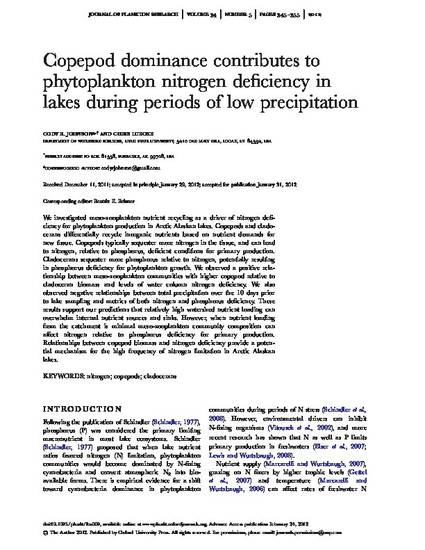
Article
Copepod dominance contributes to phytoplankton nitrogen deficiency in lakesduring periods of low precipitation
Journal of Plankton Research
(2012)
Abstract
We investigated meso-zooplankton nutrient recycling as a driver of nitrogen deficiency for phytoplankton production in Arctic Alaskan lakes. Copepods and cladocerans differentially recycle inorganic nutrients based on nutrient demands for new tissue. Copepods typically sequester more nitrogen in the tissue, and can lead to nitrogen, relative to phosphorus, deficient conditions for primary production. Cladocerans sequester more phosphorus relative to nitrogen, potentially resulting in phosphorus deficiency for phytoplankton growth. We observed a positive relationship between meso-zooplankton communities with higher copepod relative to cladoceran biomass and levels of water column nitrogen deficiency. We also observed negative relationships between total precipitation over the 10 days prior to lake sampling and metrics of both nitrogen and phosphorus deficiency.
Keywords
- copepod,
- nitrogen,
- cladocerans
Disciplines
Publication Date
2012
DOI
https://doi.org/10.1093/plankt/fbs009
Citation Information
Johnson, C.R. and C. Luecke. 2012. Copepod dominance contributes to phytoplankton nitrogen deficiency in lakes
during periods of low precipitation. J. Plank. Res. 34: 345-355.
